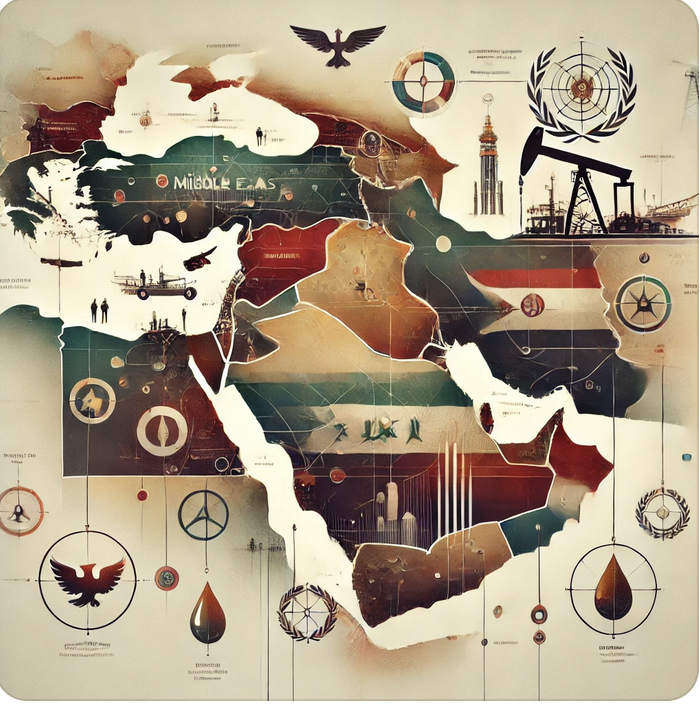

By Dr. Tim Orr
On October 7, 2023, a catastrophic event in the Middle East re-ignited tensions globally, sparking protests in cities and universities. Slogans like “Israel is a settler-colonial state” and “Zionism is racism” echoed across streets and campuses. Although framed as responses to current events, these statements are not new. They are deeply rooted in a Soviet anti-Zionist propaganda campaign that began in the Cold War and continues to influence how the Israeli-Palestinian conflict is perceived, particularly on American college campuses.
To understand why anti-Zionism has gained such momentum in academia, it is crucial to examine its historical origins. This article draws on insights from Izabella Tabarovsky, a Senior Advisor at the Kennan Institute (Wilson Center), Research Fellow at the Institute for the Study of Global Antisemitism & Policy (ISGAP), and Founding Fellow of the London Centre for the Study of Contemporary Antisemitism (LCSCA). Tabarovsky’s detailed analysis of Soviet anti-Zionist propaganda reveals how this ideology, once a tool of Soviet geopolitical strategy, has found new life on American college campuses.
The Soviet Playbook: Propaganda’s Long Reach into Academia
The roots of today’s campus anti-Zionism stretch back to the Soviet Union’s propaganda machine, which, in the wake of Israel’s 1967 victory in the Six-Day War, launched a global campaign to delegitimize Zionism. The USSR framed Zionism as an arm of Western imperialism, branding Israel as a colonial, racist, and fascist state. This rhetoric was part of a broader Soviet strategy to align itself with anti-colonial movements in the developing world, positioning Zionism as a force of oppression against the Palestinian people.
While the Soviet Union collapsed in 1991, its anti-Zionist propaganda did not disappear. Instead, it found new adherents within global leftist movements, many of which have taken root on American college campuses. Today, students who advocate for Palestinian rights often draw on the language and concepts developed during the Soviet anti-Zionist campaigns, equating Zionism with imperialism, white supremacy, and apartheid.
On campuses, this rhetoric is deeply intertwined with broader social justice movements. Anti-Zionism is frequently framed as part of the fight against global oppression, aligning with causes like Black Lives Matter and Indigenous rights. By portraying Israel as a settler-colonial state, student activists position Zionism as an extension of the very systems of power they seek to dismantle. This framing, however, simplifies the complexities of the Israeli-Palestinian conflict and often leads to a hostile environment for Jewish students.
How Soviet Anti-Zionism Evolved into Modern Campus Activism
Soviet anti-Zionist propaganda was not just ideological; it was strategic. By linking Zionism to Western imperialism, the Soviets positioned themselves as champions of anti-colonialism, gaining influence in regions like Africa and the Middle East. This legacy continues to shape campus activism, where students often view Israel through the lens of colonialism and oppression, ignoring the historical and existential threats Israel faces.
This ideological framework appeals to young campus activists, where issues of racial justice, decolonization, and human rights are prominent. By casting Israel as a colonial power, activists simplify a complex geopolitical conflict into a binary of oppressors versus oppressed—a narrative that fits neatly into broader progressive causes. However, this framework also carries the troubling legacy of Soviet-era manipulation, where facts are twisted, and historical context is ignored to fit an anti-Israel agenda.
Izabella Tabarovsky highlights that this Soviet narrative—equating Zionism with imperialism and white supremacy—was always intended to delegitimize the Jewish state. What is particularly striking is how this rhetoric, once aimed at the geopolitical landscape of the Cold War, has found a home in the intellectual atmosphere of American universities. Today, phrases like “Zionism is racism” and “Israel is an apartheid state” are repeated without consideration of their Soviet origins, shaping how many students approach the Israeli-Palestinian conflict.
Blurring the Line Between Anti-Zionism and Anti-Semitism on Campus
A dangerous aspect of Soviet anti-Zionism was its ability to blur the line between anti-Zionism and anti-Semitism. In Soviet propaganda, "Zionist" became a euphemism for "Jew," allowing the USSR to claim it opposed Zionism, not Jews, even while spreading anti-Semitic stereotypes. This tactic persists in contemporary anti-Zionist rhetoric on college campuses, where criticism of Israel often slips into anti-Semitic tropes.
Many campus activists claim their opposition to Israel is purely political, but the rhetoric used—such as comparing Israel to Nazi Germany or accusing Zionists of controlling global politics—mirrors classic anti-Semitic themes. Protests often feature signs equating the Star of David with the swastika, and slogans like “Zionists are the new Nazis” have become alarmingly common. These comparisons are not only historically inaccurate but also perpetuate harmful stereotypes, fueling hostility toward Jewish students.
The Soviet Union’s conflation of Zionism with Jewish global influence and conspiracy is echoed in the way modern anti-Zionist rhetoric targets Jewish communities. Jewish students, regardless of their stance on Israel, often find themselves excluded from campus social justice spaces if they do not denounce Zionism. This dynamic mirrors Soviet practices, where Zionists were isolated and accused of undermining socialist values, regardless of their actual views or affiliations.
Campus Boycotts and Academic Exclusion: Echoes of Soviet Tactics
Soviet anti-Zionism also sought to exclude Zionists from public life, a strategy that has found modern expression in the Boycott, Divestment, and Sanctions (BDS) movement. On campuses, BDS campaigns call for academic and economic boycotts of Israel, pressuring universities to sever ties with Israeli institutions and scholars. This echoes Soviet efforts to demonize Zionism and isolate its proponents, framing Israel as a pariah state unworthy of engagement.
BDS campaigns have contributed to a culture of exclusion, where open discussion about Israel and Zionism is stifled. Jewish students who support Israel or Zionism are often marginalized, and academic freedom is compromised in favor of ideological purity. This mirrors the Soviet approach, where anti-Zionism was enforced through institutional mechanisms that silenced dissent and excluded Zionists from academic and political spaces.
The pressure to conform to an anti-Zionist narrative creates a challenging environment for Jewish students. Many find themselves forced to choose between their Jewish identity and their desire to participate in campus social justice movements. This exclusionary atmosphere reinforces the isolation that Soviet Jews experienced under Stalin, where those who refused to renounce their Zionist identity faced persecution.
The Lasting Impact: Identity and Activism on Campus
The legacy of Soviet anti-Zionism has created a campus culture where Jewish students are often marginalized or pressured to conform to a specific narrative about Israel. For many Jewish students, supporting Israel or identifying as a Zionist can result in being ostracized from broader social justice movements. This dynamic closely mirrors Soviet tactics, where Zionists were branded as enemies of progress, even if they were part of larger revolutionary movements.
On American college campuses today, this Soviet legacy manifests in the way Jewish students must navigate spaces where anti-Zionism is framed as synonymous with progressive values. Many Jewish students find themselves caught between their personal or communal identities and the dominant campus narrative that portrays Israel as an oppressor. This situation is exacerbated by the fact that anti-Zionist rhetoric often morphs into anti-Semitic incidents, making Jewish students targets for harassment and exclusion.
Conclusion: Recognizing and Challenging the Legacy of Soviet Anti-Zionism on Campus
To address the resurgence of anti-Zionism on American college campuses, it is essential to recognize its Soviet origins. The rhetoric and slogans that dominate campus discourse today are not new; they are part of a carefully crafted propaganda campaign designed to delegitimize Israel and isolate Zionists. The Soviet Union may be gone, but its anti-Zionist ideology continues to influence how Zionism is discussed and debated in academic spaces.
Izabella Tabarovsky’s analysis underscores the importance of understanding this history. By exposing the roots of contemporary anti-Zionist rhetoric, we can challenge the exclusionary and often anti-Semitic dynamics that pervade campus activism. Recognizing the Soviet influence behind modern anti-Zionism allows us to foster a more inclusive and respectful dialogue about the Israeli-Palestinian conflict, one that acknowledges complexity rather than perpetuates division.
Without this awareness, we risk allowing the toxic legacy of Soviet propaganda to continue shaping how future generations view Israel, Zionism, and Jewish identity. By reclaiming the conversation and challenging the rhetoric, we can create a campus environment where students engage in open, honest, and respectful discourse.
ISCA Indiana University. Soviet Antizionism and Contemporary Left Antisemitism. YouTube, 20 Nov. 2023, https://www.youtube.com/watch?v=cJs4-IVT3Us&t=1815s.
Tim Orr is a scholar, Evangelical minister, conference speaker, and interfaith consultant with over 30 years of experience in cross-cultural ministry. He holds six degrees, including a master’s in Islamic studies from the Islamic College in London. Tim taught Religious Studies for 15 years at Indiana University Columbus and is now a Congregations and Polarization Project research associate at the Center for the Study of Religion and American Culture at Indiana University Indianapolis. He has spoken at universities, including Oxford University, the University of Tehran, and mosques throughout the U.K. His research focuses on American Evangelicalism, Islamic antisemitism, and Islamic feminism, and he has published widely, including articles in Islamic peer-reviewed journals and three books.
Check Out Tim's Articles!
 Dr. Tim Orr's BlogDr. Tim Orr
Dr. Tim Orr's BlogDr. Tim Orr
 Dr. Tim Orr's BlogDr. Tim Orr
Dr. Tim Orr's BlogDr. Tim Orr
Sign up for Dr. Tim Orr's Blog
Dr. Tim Orr isn't just your average academic—he's a passionate advocate for interreligious dialogue, a seasoned academic, and an ordained Evangelical minister with a unique vision.
No spam. Unsubscribe anytime.
